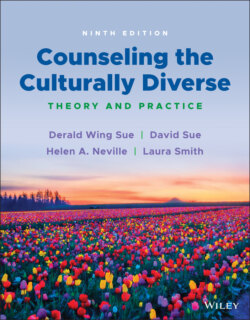Читать книгу Counseling the Culturally Diverse - Laura Smith L. - Страница 57
THE IMPACT OF GROUP IDENTITIES ON COUNSELING AND PSYCHOTHERAPY
ОглавлениеAccepting the premise that race, ethnicity, and culture are powerful variables in influencing how people think, make decisions, behave, and define events, it is not far‐fetched to conclude that such forces may also affect how different groups define a helping relationship (Herlihy & Corey, 2015). Culturally responsive psychologists have long noted, for example, that different theories of counseling and psychotherapy represent different worldviews, each with its own values, biases, and assumptions about human behavior (Geva & Wiener, 2015). Given that U.S. schools of counseling and psychotherapy arise from Western European contexts, the worldview that they espouse as reality may not be shared by racial/ethnic minority groups in the United States, or by those who reside in different countries (Lorelle, Atkins, & Michel, 2021; Parham et al., 2011). Each racial, ethnic, or cultural group has its own perspective on the nature of people, the origin of disorders, standards for judging normality and abnormality, and therapeutic approaches.
Among many Asian Americans, for example, a self‐orientation is considered undesirable, whereas a group orientation is highly valued (Kim, 2011). The Japanese have a saying that goes like this: “The nail that stands up should be pounded back down.” In other words, healthy development is considering the needs of the entire group, whereas unhealthy development is thinking only of oneself. Likewise, relative to their EuroAmerican counterparts, many African Americans value the emotive and affective qualities of interpersonal interactions as qualities of sincerity and authenticity (West‐Olatunji & Conwill, 2011). EuroAmericans often view the passionate expression of affect as irrational, impulsive, immature, and lacking objectivity on the part of the communicator. Thus, the autonomy‐oriented goal of counseling and psychotherapy and the objective focus of the therapeutic process might prove antagonistic to the worldviews of some Asian Americans and African Americans, respectively.
It is therefore highly probable that different racial and ethnic minority groups perceive the competence of the helping professional differently than do mainstream client groups. Further, if race and ethnicity affect perception, what about other group differences, such as gender and sexual orientation? Minority clients may see a clinician who exhibits therapeutic skills that are associated primarily with mainstream therapies as having lower credibility. The important question to ask is, “Do such groups as racial/ethnic minorities define cultural competence differently than do their EuroAmerican counterparts?” Anecdotal observations, clinical case studies, conceptual analytical writings, and some empirical studies seem to suggest an affirmative response (Fraga, Atkinson, & Wampold, 2002; Garrett & Portman, 2011; Guzman & Carrasco, 2011; McGoldrick, Giordano, & Garcia‐Preto, 2005).
